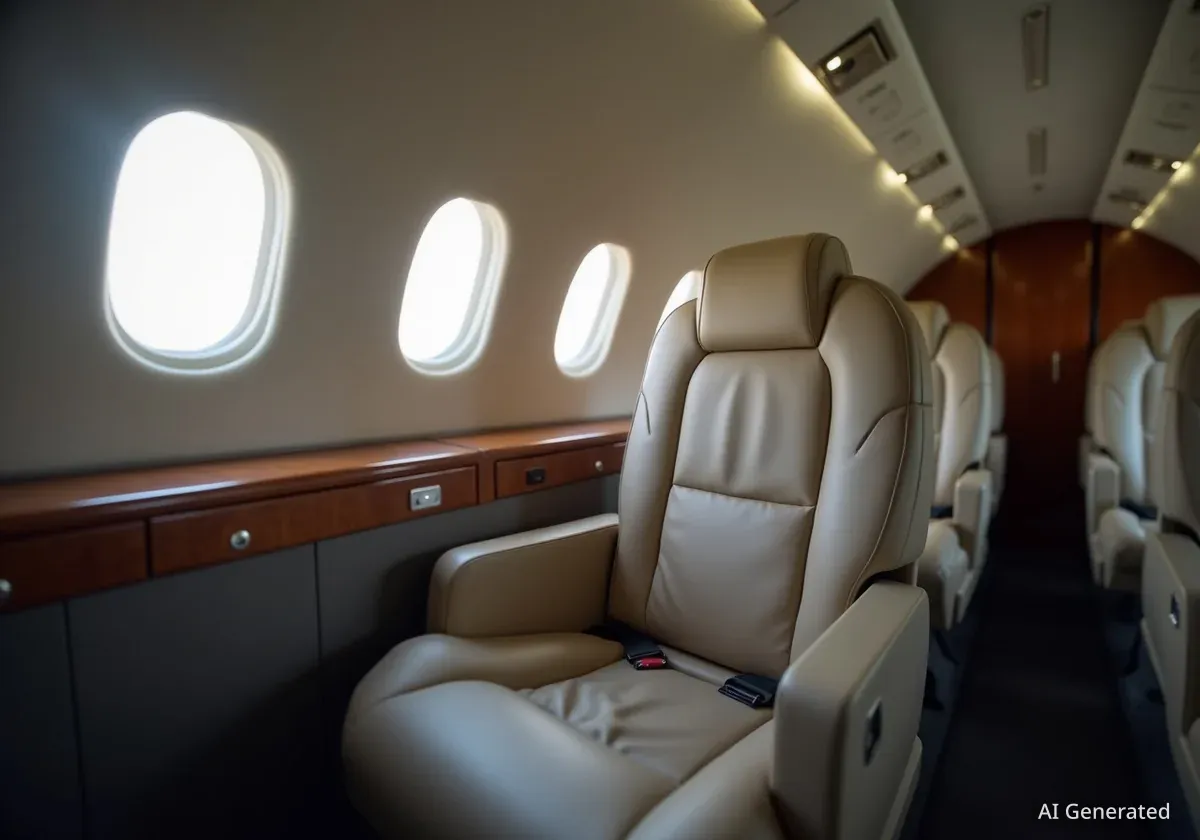Private jet seat sharing has become popular through invite-only chat groups, allowing individuals to find empty seats on private flights. Travelers pay for these seats using digital payment apps. However, this practice faces strong opposition from aviation regulators, who deem it illegal and a potential safety risk. Authorities are actively working to stop these operations, while some argue for a regulated system similar to those in other countries.
Key Takeaways
- Private jet seat sharing is growing via underground chat groups.
- The FAA considers selling seats without proper certification illegal and unsafe.
- Current regulations prohibit pilots from publicly offering seats for compensation.
- Europe and Australia have models for legal, regulated cost-sharing flights.
- Advocates suggest new regulations to make private jet seat sharing safe and legal.
Rise of Underground Private Jet Sharing
Over the past year, private chat groups on platforms like WhatsApp and Telegram have seen a significant increase in activity. Private jet owners and individuals with fractional shares in jets use these groups to offer empty seats on their flights. Common routes include New York to Palm Beach, Aspen to Southern California, and Texas to Cabo.
Payments for these seats are typically handled through digital services such as Cash App, Square, and Venmo. Access to these exclusive chat groups is often by referral only. Posts within these groups are direct, for example: "2 seats open, TEB→PBI Friday 2pm, $X per seat."
Fact: High Demand for Private Jet Seats
Even ultra-high net worth individuals are participating in these underground seat-sharing arrangements, indicating a broad demand for more accessible private air travel options.
Legal Challenges and Regulatory Stance
Despite its popularity, selling seats on private jets in this manner is highly illegal in the United States. The Federal Aviation Administration (FAA) has acknowledged these private jet seat offers. The agency states it is "working aggressively" to shut down such operations.
The FAA's regulatory power focuses on operators, aircraft, and pilots. It does not directly regulate the messaging platforms where these offers appear. Instead, the FAA targets the flights themselves and the individuals operating them. It cannot directly intervene with platforms like WhatsApp or Square.
"The FAA's 'Safe Air Charter' initiative warns that selling seats without the proper certificates is illegal and a safety risk. Penalties can include certificate action and civil fines."
Understanding FAA Regulations
Under federal aviation rules (14 CFR § 61.113(c)), a private pilot can share operating expenses with passengers. These expenses include fuel, airport fees, and a pro-rata share of rental costs. However, strict conditions apply:
- The pilot must pay at least an equal share of the expenses.
- The pilot and passengers must have a common purpose for the flight.
- There must be no "holding out" or offering of seats to the general public.
Selling seats to the public, or to an undefined group, is considered 'common carriage.' This triggers specific requirements under Part 119/135, which include obtaining an air carrier operating certificate, maintaining detailed manuals, implementing maintenance programs, and adhering to strict crew duty limits.
Background: Public Charters
Public charters, where individual seats are sold without the seller being the direct operator, are possible. However, they require authorization under DOT Part 380. This involves an accepted charter prospectus before any seats can be sold or money collected. Companies like JSX and Aero use Part 380 to sell individual seats on chartered aircraft legally.
Past Attempts and FAA Enforcement
About ten years ago, platforms often called 'Uber for Private Jets,' such as AirPooler and Flytenow, emerged. The FAA took strong action against them. The agency concluded that pilots using these platforms to advertise expense-sharing flights were engaged in "holding out." This meant they were operating as common carriers without the necessary certifications.
These platforms aimed to connect pilots flying somewhere with individuals willing to contribute to fuel costs for a ride. The FAA deemed this illegal.
The Flytenow Legal Challenge
Flytenow challenged the FAA's interpretation in court. They argued that online postings were similar to bulletin board notices seen at flight schools and fixed-base operators (FBOs). They also contended that expense sharing should not be classified as "compensation" requiring commercial certification.
The D.C. Circuit Court disagreed. It ruled that any payment constitutes "compensation" for these purposes. The court also held that platform-based postings, even in "members-only" forums, represent "holding out." This decision effectively shut down Flytenow, and the Supreme Court declined to review the case.
Fact: Advisory Circular on Expense Sharing
In 2020, the FAA issued an advisory circular on expense sharing. It reiterated the importance of common purpose, pro-rata sharing, and the absence of "holding out." The circular explicitly linked online and app postings to the "holding out" analysis.
A Call for Modernized Regulations
Many industry observers believe the FAA's current approach is outdated. They point to successful models in Europe and Australia as examples of how private jet seat sharing can be regulated safely and legally. Critics argue that the existing ban protects established operators and discourages efficient use of aircraft.
Restricting seat sharing limits innovation in aviation services. It prevents the development of marketplaces that could efficiently match demand and supply for half-empty private jets. Proponents argue that a transparent marketplace would offer more options to travelers without creating undue risk.
"The burden to just straight up shut this down should require demonstrating real, unmanageable safety harm."
International Models for Cost Sharing
Australia's Civil Aviation Safety Authority (CASA) permits cost-sharing flights under specific conditions:
- The aircraft must have a maximum of six seats, including the pilot.
- Pilots and passengers must equally split direct costs, such as fuel, oil, and airport fees. The pilot must pay at least their equal share.
- Public marketing of these flights is prohibited.
The United Kingdom and the European Union also allow private pilots to share direct flight costs with passengers. These flights must remain non-commercial, with no profit component. Passengers are typically capped at five, plus the pilot.
Upcoming Changes in the UK
Starting next month, the U.K. will permit advertisements for cost-sharing flights. These advertisements must include specific disclosures. Examples include the origin and destination, the pilot's license type, a statement that it is a private arrangement, and the total hours flown by the pilot.
Platforms will also be allowed to facilitate cost sharing. They must comply with a "Cost Sharing Charter." This charter ensures transparency and requires disclaimers for participants. This demonstrates that even highly regulated environments can adapt to new models of air travel.
Addressing Concerns and Future Outlook
Concerns about safety and insurance viability are often raised against legalizing private jet seat sharing. However, advocates argue that risks exist in many other transport domains, such as helicopter tours. They propose that oversight, rather than outright prohibition, is the proper solution.
If insurers refuse coverage, this provides market feedback. For low-risk activities involving vetted pilots, insurance can be priced accordingly. The argument that it disrupts existing charter models is seen as an attempt to block competition, not a safety concern.
These flights often involve planes already flying safely with empty seats. Legalizing seat sharing would increase efficiency and reduce the per-passenger carbon footprint. It would also meet a clear passenger need. Creating regulated marketplaces with clear guidelines is considered a better approach than pushing these activities underground.
Proposed Regulatory Framework
A potential framework for legalized private jet seat sharing could include:
- Allowing small "rideshare" flights for 3 to 6 passengers with light regulation.
- Capping total annual flights per pilot, or limiting distance or hours, before requiring full charter certification.
- Requiring clear disclosures on pilot qualifications, aircraft history, maintenance records, and risk levels.
- Mandating additional insurance or liability coverage for these flights.
- Authorizing platforms that vet pilots, collect safety data, and enable passenger reviews.
- Initially permitting flights only in good weather (VFR conditions), without night or instrument-only operations, with a path to extending operations as safety data is collected.
Ultimately, regulatory burdens should scale with demonstrated safety performance. If seat-share flights prove comparable in safety to charter flights in similar aircraft, regulations could be relaxed. The goal is to make air travel more convenient, affordable, and accessible by utilizing existing aircraft and planned trips efficiently.





